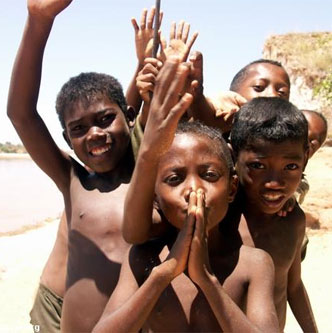Madagascar faces food shortage in the southeast
wildmadagascar.org
November 21, 2005
With up to 18,000 children in Madagascar’s south-eastern region showing signs of acute malnutrition, United Nations agencies are supporting Government-initiated emergency food and medical assistance, the UN Office for the Coordination of Humanitarian Affairs (OCHA) said in a press release last week.
A recent nutritional assessment, conducted in the Atsimo Atsinanana region by inter-agency teams comprised of Government, United Nations Children’s Fund (UNICEF), World Food Programme (WFP), and non-governmental (NGO) personnel, indicated that up to 14,000 children may be acutely malnourished and 3,700 suffering severe malnutrition.
Repeated floods, insect infestation and drought, and lack of a clove harvest due to the biannual cycle of the crop are thought to have turned chronic food shortages into an emergency situation this year, OCHA said.
In response to the situation, the Government is providing food, material and medical assistance, with support from UNICEF, WFP, and NGOs German Agro-Action, Catholic Relief Services and Caritas.
The WFP intends to provide some 300 tons of food for targeted distribution to 7,800 families with children at serious risk. Approximately 200 tons of this assistance will be distributed as take-home rations for primary school students. The WFP will also increase its food-for-work activities.
 Children in Madagascar. Photo by R. Butler |
UNICEF will work with the Government to establish five therapeutic and supplementary feeding centres, and will complement WFP’s efforts through the provision of sugar and oil.
Madagascar, an island located in the Indian Ocean, is one of the world’s poorest countries.
Related articles
Collapsing vanilla prices will affect Madagascar: Surging vanilla production in countries from Papua New Guinea to Colombia is causing the price of vanilla beans and extract to plummet in markets around the world. The drop in vanilla prices is expected to hit Madagascar, the world’s largest producer of vanilla beans, especially hard. Most affected will be growers in the tropical northeastern part of the island who have relied on the valuable crop for years.
A look at why is Madagascar so poor: Madagascar is one of the world’s poorest countries. In the Human Development Index of 2003, an indicator created by the United Nations Development Programme which measures achievements in terms of life expectancy, educational attainment and adjusted real income, Madagascar was ranked #149 out of 175 counties. Most Malagasy live on less than a dollar per day and nearly half of the country’s children under five years of age are malnourished.
Madagascar looks toward a brighter economic future with movie, new aid package: The planet’s most biologically diverse island is also one of the poorest countries in the world. Madagascar, the world’s fourth largest island at about size the size of Texas or France, has an average per capita income of $260 among its 18 million people. About 70 percent of its population lives below the poverty line while nearly half of its children under five years of age are malnourished. In the past three years the country has nearly experienced a civil war and seen the agricultural based economy hit rock bottom during the political turmoil of the past presidential election. Nevertheless Madagascar may well be on its way to a brighter economic future thanks to a blockbuster animated movie, an innovative new aid program, and the capable leadership of the new president.
Group completes first megatransect of Madagascar: Late last year an international team completed the first known transect of the island of Madagascar, the world’s fourth largest island. The eight-month-long journey, dubbed “Hike Madagascar,” took the group of intrepid hikers from the southern tip of Madagascar to the northernmost point of the island. The transect targeted rural communities along the eastern forest corridor, surveying villages and providing local farmers with techniques for improving rice yields and putting more food on the table for their families. The hike also provided a glimpse into some of the socioeconomic and environmental issues facing the island nation, which is one of the poorest in the world.
Madagascar announces oil discovery; island nation to start producing crude in 3-4 years: Madagascar, the world’s fourth largest island, announced the discovery of several oil blocks on land and offshore. The Indian Ocean island nation expects to start producing crude oil for the first time within the next 3-4 years, according to a report from Reuters.
Falling price of rice calms street violence in Madagascar — Reuters: According to the agriculture minister of Madagascar, the country’s rice output has increased causing prices of the island’s staple food to fall and reducing the risk of further unrest over the rising cost of living. Last month the capital city of Antananarivo was rocked by protests over rising inflation. Students took to the streets throwing rocks and petrol bombs at police while setting fires. These demonstrations were mild in comparison to last June’s protests where students were joined by army reservists and poor mothers.
A long-term approach to helping the poor in Africa through private enterprise: This past Saturday millions of people watched the anti-poverty “Live 8” concerts held in London, Tokyo, Johannesburg, Paris, Rome, Berlin, Moscow, Philadelphia and Barrie, Canada. Live 8 coincides with tomorrow’s G8 summit of world leaders and aims to raise awareness of the need for aid, debt relief and fairer trade for Africa. While the cancellation of debt and delivery of aid to Africa is a noble and needed cause for a desparately poor continent, policy makers will need to ensure that funds are spent wisely to maximize the benefits for the largest number of Africans. In the past, aid to the developing world has met mixed reviews. Some of the largest recipients of aid are still some of the world’s poorest countries. What’s going on here? Have aid agencies just been throwing money into a hole?
This article includes a modified news release from the UN.







